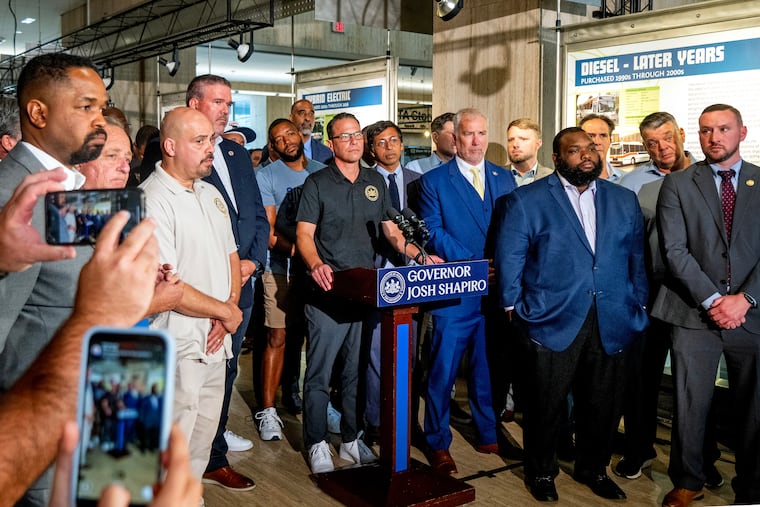Not funding SEPTA could constitute a violation of the Pa. Constitution
Pennsylvanians have a constitutional guarantee that “The people have a right to clean air.” Gutting transit will greatly increase pollution.

By Thursday, Pennsylvania lawmakers have a choice: uphold the state constitution, or violate it. If they fail to act, SEPTA will begin slashing public transit service on Aug. 24, eliminating 32 bus routes, shortening 16 more, and reducing frequency across the system, including trolleys, subways, and Regional Rail. These are not just budget decisions. They are constitutional failures.
Article I, Section 27 of the Pennsylvania Constitution guarantees that “[t]he people have a right to clean air, pure water, and to the preservation of the natural, scenic, historic and esthetic values of the environment.” It also charges the commonwealth with a solemn duty: “As trustee of these resources, the Commonwealth shall conserve and maintain them for the benefit of all the people.”
Gutting transit in the nation’s eighth-largest metro region does not conserve or maintain anything. It will do the opposite: It will increase pollution, widen inequality, and push us backward on every climate and economic goal the state claims to care about.
More cars on the road mean more tailpipe emissions, more ozone, more particulate matter, and more asthma. For many working families, these cuts are a forced surrender to longer commutes, fewer job options, and higher costs.
This is not simply theoretical. The results are obvious: more driving, more emissions, more sprawl, and less access. That’s a policy choice with constitutional consequences.
And it raises a basic question of fairness. Roads and highways are also public infrastructure. We never ask drivers to justify road spending. There’s no annual crisis over whether to fund I-95 or repave Route 30. Billions in road maintenance and expansion pass without controversy.
So why is public transit, which is used by hundreds of thousands of Pennsylvanians every day, treated like an optional luxury?
But transit is far from an opulent civic amenity. It is core infrastructure. And especially when thinking of the environment and the economy, transit agencies deliver more per dollar than any highway ever could.
Every bus route saved means fewer cars on the road. Every subway trip taken is fuel not burned. But the benefits don’t stop at air quality. Public transit boosts local economies, connects people to jobs, reduces congestion, and makes cities more resilient. Reliable transit attracts investment, supports tourism, and expands opportunity. Cutting it is not fiscally responsible; it’s economically self-defeating.
» READ MORE: 3 of Pa.’s largest employers urge: Fund SEPTA and other mass transit now | Opinion
For years, SEPTA has been operating on the edge. Its federal pandemic aid is gone. Its ridership is recovering, but not fully back. It needs a sustainable funding commitment from Harrisburg. Other states have figured this out. Pennsylvania is dragging its feet, even as the clock runs out.
Lawmakers might argue that the budget is tight. That’s no excuse. Constitutional rights don’t come with fine print. The state’s obligation to protect the environment and, by extension, to fund the systems that make clean air possible, is not optional. The General Assembly has the power to prevent this crisis. If it lets the Aug. 14 deadline pass, it is choosing to violate the very document it swore to uphold.
And it will be doing so in plain view of future generations, who will inherit the costs.
SEPTA needs stable, recurring funding. Not political theater, not finger-pointing. The people of Pennsylvania need leaders who understand that environmental protection isn’t just about parks and rivers, it’s about transit, too. And it’s about the basic right to breathe clean air and live in a livable community.
If the commonwealth won’t act to preserve public transit, then it’s not just SEPTA that’s derailed; it’s our constitutional rights.
Let’s be clear: It’s the Pennsylvania Senate that’s holding up the funding fix SEPTA needs. And while many Inquirer readers may not be in the majority’s districts, that doesn’t mean we’re powerless.
Use your voice. Call out the obstruction. Demand action. Reach out to Senate leaders Kim Ward and Joe Pittman, and tell them Pennsylvanians, current and future, have a right to clean air and a livable environment.
This isn’t just a Philadelphia problem. It’s a constitutional problem.
Ashlei Tracy is a nonprofit executive and public policy strategist.